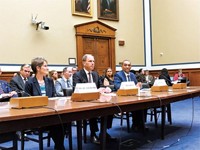Advertisement
Grab your lab coat. Let's get started
Welcome!
Welcome!
Create an account below to get 6 C&EN articles per month, receive newsletters and more - all free.
It seems this is your first time logging in online. Please enter the following information to continue.
As an ACS member you automatically get access to this site. All we need is few more details to create your reading experience.
Not you? Sign in with a different account.
Not you? Sign in with a different account.
ERROR 1
ERROR 1
ERROR 2
ERROR 2
ERROR 2
ERROR 2
ERROR 2
Password and Confirm password must match.
If you have an ACS member number, please enter it here so we can link this account to your membership. (optional)
ERROR 2
ACS values your privacy. By submitting your information, you are gaining access to C&EN and subscribing to our weekly newsletter. We use the information you provide to make your reading experience better, and we will never sell your data to third party members.
Environment
Dioxin and Dow in Michigan
October 20, 2008
| A version of this story appeared in
Volume 86, Issue 42
IT IS UNFORTUNATE that no scientists were interviewed in the featured article by Cheryl Hogue on dioxins in two Michigan rivers (C&EN, Aug. 11, page 15). Rather, C&EN chose to publicize the views of environmental activists, who will never be satisfied.
This illustrates the "straining at gnats" characteristic of environmental activist groups. One would expect a more balanced report by an organization representing the chemical profession.
In dealing with the perceived problem, Dow Chemical has spent millions of dollars on cleanup activities. But what level is "sufficient" when one is dealing with parts per trillion? The article did not mention the scientific study by the University of Michigan showing residents living along the river have no higher exposure to dioxins and furans than people living elsewhere. Nor was the Michigan State University study mentioned showing that there is no harm to wildlife populations that live intimately in the river environment.
Also, there have been no adverse human health occurrences, even with much higher accidental exposures to dioxins in industrial settings. Surely the Environmental Protection Agency, Michigan Department of Environmental Quality, and community health groups could prioritize their efforts and concentrate on problems where they can make a real improvement to human health.
Eldon Graham
University Center, Mich.
THE DOW DIOXIN STORY and your editorial (C&EN, Aug. 11, page 5) seem balanced. I like a considered approach to problems such as the dioxin issue.
The dioxin in the sediment of rivers is now in a safe place, and it may be best to leave it there. Digging in the bottoms and shores of the rivers will mix the dioxin with the silt and water, which will put it back into and moving through the environment.
Dow seems like a responsible chemical company. Many are not, and we live with that truth every day. Come to China, and I can show you some serious problems at chemical companies.
Perhaps ACS should support Dow Chemical for its positions on dioxin and on Responsible Care, product stewardship, safety of workers, community projects, and the support they give the chemical industry. C&EN should balance the problems with the promise that the chemical industry offers.
Frank Stewart
Hong Kong and Saipan
ONE ISSUE your well-written article avoids focusing on is those of us whose health has been affected by exposure to Dow Chemical's dioxin. Dow argues that Tittabawassee riverside residents have not been harmed by the exposure to dioxin.
I'm here to report just the opposite through my own personal experiences. My family, and I in particular, suffer from several adverse health conditions known to be caused by exposure to dioxin.
Dow spokesman John C. Musser is well aware that there are those of us whose health has been affected. For public appearance, and Dow Chemical's economic sake, he continues to deny our adverse situation.
Counsel has suggested that we avoid going the route of trial via the media. Dow has effectively tied us up in a protracted years-long civil action. We are anxiously awaiting our day in court. From previous knowledge of situations like our own, resolution takes decades if it ever comes. We wait in frustration as cancer continues to play its cruel trick on us.
Meanwhile, we were medically advised to immediately move out of our contaminated Tittabawassee riverside residence because we should not remain in an environment that adds to our current heavy body burden of dioxin.
Little or nothing is being said about Dow's responsibility to members of my family who, for more than 30 years, have been adversely affected by dioxin exposure and are ill from the effects. There is only talk of protecting the public in the future from the adverse protracted ill health effects we have been experiencing.
As a frustrated chemical contamination refugee, I see no current resolution or justice for those of us in this horrendous situation who have been delayed as we go through a continuous round of medical treatments.
Howard Steinmetz
Boulder, Colo.
Cheryl Hogue responds:
THE HEALTH-RELEVANT results of the University of Michigan study and the Michigan State University research cited have not yet been published in a peer-reviewed journal.
C&EN's article focused on the actions of state and federal regulators, who rarely rely on unpublished studies for cleanup decisions. The differences among the U.S. Environmental Protection Agency, the Michigan Department of Environmental Quality, Dow, and environmental activists about the cleanup are in large part due to gaps in scientific understanding about risk from dioxins.
Health results of the human exposure study led by David H. Garabrant, emeritus professor of environmental health sciences and epidemiology at the University of Michigan, are undergoing review for publication, Garabrant tells C&EN. He says the study, which was funded by Dow in an unrestricted grant, concludes that age is the most important factor linked to higher levels of dioxins in people's blood. It finds that living on contaminated soil does not contribute to the level of dioxins in blood, he says.
The Michigan State wildlife health results have recently been accepted for publication, according to lead author Matthew Zwiernik of the university's National Food Safety & Toxicology Center. Despite several requests from C&EN, neither Zwiernik nor the university provided further details.




Join the conversation
Contact the reporter
Submit a Letter to the Editor for publication
Engage with us on Twitter